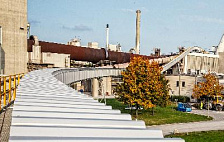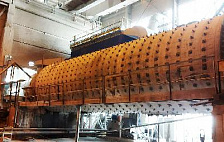Russian ecological operator (REO), a state-owned waste management company, proposed to compensate cement plants for the costs of switching to using fuel from recycled waste at the expense of resources from the Extended Producer Responsibility (EPR) fund. The CEO of REO Denis Butsaev spoke to RBC about it.
“According to our information, two thirds of cement plants are ready to accept waste, but some require serious modernization. Such work was started by EUROCEMENT group, and we are looking at what investment program they will offer (for the modernization of factories - RBC)," Butsaev noted. According to a representative of REO, the company was negotiating on the use of alternative fuel from waste (RDF fuel) instead of hydrocarbon fuel with nine cement holdings, which own 28 plants. Cooperation documents were signed with EUROCEMENT group and LafargeHolcim.
President Vladimir Putin called one of the national goals to achieve by 2030 a reduction in the disposal of solid municipal waste (MSW) at landfills to 50% of their generation (instead of the current 94%). Annually, according to various sources, 60–70 million tons of such waste is generated in Russia.
The managing director of the rating service of the National Rating Agency, Sergei Grishunin, estimated the modernization of all 58 cement plants in Russia to be able to operate on RDF-fuel at 14.5 billion rubles. This will make it possible to utilize from 6 to 8 million tons of MSW (that is, approximately 10–12% of the generated waste per year). According to REO, the modernization can cost 13.5 billion rubles.
Cement plants that decide to upgrade will be able to reimburse the capital costs of creating the infrastructure needed to receive and dispose of waste (eg, acceptance mechanisms, new equipment for kilns). The amount of state support has not yet been determined and will depend on logistics, equipment at a particular plant, etc.
It is also planned to compensate companies for operating expenses, including fuel transportation.
Two approaches to the provision of support measures under the ROP are discussed. According to the first scenario, only the plants themselves will receive funds, which will pay their counterparties: the carriers of waste and those who collect it.
The second scenario is to pay in a certain proportion to all participants in waste disposal: both factories and carriers. According to Grishunin, the idea of the head of REO to split the payment for the disposal of MSW (about 5 thousand rubles per ton) between carriers and utilizers looks attractive, since transferring the entire amount only to cement workers carries the risk of interruptions in garbage removal from cities.
The amount required for the modernization of all cement plants (14.5 billion rubles) will not be claimed at once, Grishunin notes, so it should not provoke an increase in the tariff for garbage collection.








